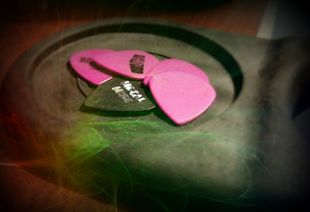
What's in a guitar pick? Well, apparently a lot. I have been thinking about how I found the guitar pick that I have been using for the last 15 years - the amazing Dunlop H3 Tortex. I have been using and experimenting with different picks for a long time and when I found the Dunlop Jazz III I thought I had it. But, as it turned turned out the smoother side of the Tortex pick worked out even better for me.
When choosing a pick pay attention to how it effects your sound. Do you get a lot of swoosh, flap or noise when you play? It could very well (and, probably is) be your guitar pick.
Most metal players use a pick that is at least medium in heaviness. If the guitar pick gives too much because it is too thin - you get a significant amount of noise in your playing.
I like the H3 which is a small pick and it took me a while to develop the exact technique that I can use it effectively in playing rhythm and lead. Many guitarists find that they find a pick that works good for leads, but not so much for rhythm. There is a little give and take. With some work, I found out my H3 to be great for both. There were times in the studio when I had a different pick for different sounds that I wanted to get out of the guitar, but I later scrapped that idea in favor of using one pick and learning how to get the most out of it.
Ultimately, you'll have to find a pick that you can use equally well for both rhythm and lead. Of course, this is essential when playing live as there is no time to switch picks between lead licks and riffs.
As you know, picks are made from different materials and they all affect your guitar sound. Some players might prefer a nylon pick, while you might find Tortex to work best for your tone. This is important to keep in mind.
Usually a pick with some sort of an edge at the tip is better for leads. Smaller picks are tougher to use when you play heavy rhythms as you have less plastic to hit the string with and your hand can get tired sooner. (This is also a technique you need to master.) You adjust and see what you can improve. Light Fender type rounded picks are better for acoustic playing and when I see a student use them while wanting to play metal we quickly make the adjustment to something slightly heavier in order to gain better tone, clarity and precision.
Usually a pick with some sort of an edge at the tip is better for leads. Smaller picks are tougher to use when you play heavy rhythms as you have less plastic to hit the string with and your hand can get tired sooner. (This is also a technique you need to master.) You adjust and see what you can improve. Light Fender type rounded picks are better for acoustic playing and when I see a student use them while wanting to play metal we quickly make the adjustment to something slightly heavier in order to gain better tone, clarity and precision.
Good luck on your search.
